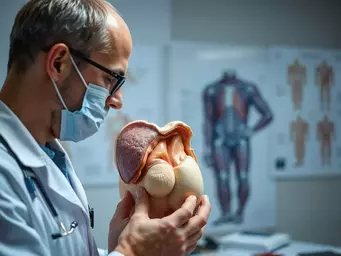Dietary Choices for Hormone Balance

Have you ever considered how your diet might influence your hormone levels? The connection between what you consume and your body's hormonal balance is not just theoretical; it's a crucial aspect of managing conditions like hypogonadism. By understanding the role of diet, you can take significant steps towards enhancing your overall health and vitality.
What You Will Learn
- Hypogonadism can be classified into primary and secondary types, each affecting hormone production differently.
- Nutrients like zinc and vitamin D are essential for maintaining healthy testosterone levels.
- Incorporating healthy fats into your diet supports hormone production and nutrient absorption.
- Gradual dietary changes, such as meal prepping and tracking food intake, can lead to sustainable improvements in hormonal health.
- Consulting healthcare providers for personalized advice can enhance your approach to managing hypogonadism through diet.
The Impact of Diet on Hypogonadism
This visual highlights key dietary components and their influence on hormone balance, particularly in the context of hypogonadism. It also outlines a practical approach to implementing dietary changes and emphasizes the importance of professional consultation.
Key Nutrients & Their Role
- •Zinc: Essential for testosterone production.
- •Vitamin D: Linked to healthy testosterone levels.
- •Healthy Fats: Crucial for hormone synthesis.
Practical Dietary Approaches
- •Start Small: Introduce changes gradually.
- •Meal Prep: Plan and prepare meals weekly.
- •Stay Hydrated: Aim for 8 cups of water daily.
- •Portion Control: Balance proteins, fats, carbs.
Importance of Consultation
- •Healthcare Providers: Vital for personalized advice & treatment.
- •Hormone Testing: Essential for accurate diagnosis.
- •Meal Planning: Align diet with specific health goals.
The Role of Diet in Managing Hypogonadism
Diet plays a crucial role in managing hypogonadism, a condition that affects many individuals' hormone balance. As an endocrinologist, I’ve seen how dietary choices can greatly influence testosterone levels and overall health. Understanding the connection between what we eat and our hormone health is essential for anyone facing the challenges of testosterone deficiency.
Hypogonadism is not just about low testosterone; it can also manifest in various ways, affecting mood, energy levels, and sexual health. By exploring the relationship between diet and hormone balance, we can identify practical strategies to improve health outcomes and enhance vitality.

Understanding Hypogonadism: Types and Prevalence
Hypogonadism can be classified into two main types: primary and secondary. Primary hypogonadism occurs when the testicles fail to produce sufficient testosterone, while secondary hypogonadism is due to issues in the hypothalamus or pituitary gland that affect hormone signaling. This condition is more prevalent than many might think, impacting men and women alike. For a deeper understanding of hypogonadism and its various facets, you can refer to comprehensive resources like those provided by PMC NCBI.
- Primary Hypogonadism: Issues with the testicles directly
- Secondary Hypogonadism: Problems with the hormonal signaling
- Prevalence: Common in aging males, but can affect various demographics
Being informed about these types can empower individuals facing hypogonadism to seek appropriate treatment and lifestyle adjustments. The importance of diet becomes even clearer when considering these classifications and their respective impacts.
Connecting Diet and Hormone Balance: Mechanisms at Play
The connection between diet and hormone balance is supported by various mechanisms. Certain nutrients play pivotal roles in hormone production and regulation. For instance, vitamins and minerals such as zinc and vitamin D are critical for testosterone synthesis. Research has increasingly highlighted the significance of diet in managing hypogonadism, as discussed by the European Society of Endocrinology.
- Zinc: Essential for testosterone production and overall reproductive health.
- Vitamin D: Associated with healthy testosterone levels; often lacking in many diets.
- Healthy Fats: Necessary for hormone production and absorption of fat-soluble vitamins.
Recognizing these connections is the first step toward making dietary choices that support hormonal health. As we dive deeper into the specific foods that can enhance testosterone levels, you’ll see how simple dietary adjustments can lead to significant improvements in well-being.
Interactive Poll: Your Dietary Changes
Have you made any dietary changes to support your hormone health? We'd love to hear from you! Please share your thoughts below:
Frequently Asked Questions (FAQs)
- What is hypogonadism?
- Hypogonadism is a condition where the body does not produce enough sex hormones (like testosterone). It can be primary (issues with the sex organs) or secondary (issues with the brain's control over hormone production).
- How does diet affect hypogonadism?
- Diet plays a crucial role by providing essential nutrients like zinc and vitamin D, which are vital for hormone synthesis and regulation. Healthy fats are also important for hormone production and nutrient absorption.
- What are some key nutrients for hormonal health?
- Key nutrients include zinc (essential for testosterone production), vitamin D (linked to healthy testosterone levels), and healthy fats (crucial for hormone synthesis).
- What practical steps can I take to implement dietary changes?
- Start small by introducing one new healthy food at a time, meal preppng, staying hydrated, practicing portion control, and keeping a food journal to track progress and identify patterns.
- Why is consulting healthcare providers important for managing hypogonadism through diet?
- Healthcare providers can offer personalized advice, conduct hormone testing for accurate diagnosis, and help integrate dietary changes into a comprehensive treatment plan tailored to your specific needs. Further insights into the diagnosis and management of hypogonadism are available through resources such as PMC NCBI.
Summarizing the Key Takeaways for Hormonal Health
Improving your hormonal health through dietary changes can have a significant impact on managing conditions like hypogonadism. As we’ve explored, the foods you consume play a crucial role in maintaining testosterone levels and overall hormone balance. It’s empowering to know that simple changes in your diet can help you feel more energized and vibrant!
From incorporating nutrient-rich foods like fatty fish and leafy greens to being mindful of what you limit or avoid, the path to better hormonal health is both achievable and rewarding. Remember, this journey is about understanding your body and nurturing it with the right fuel. Let's dive into some practical approaches for implementing these dietary changes.

Implementing Dietary Changes: A Practical Approach
- Start Small: Introduce one new food at a time. For instance, add fatty fish to your meals a couple of times a week.
- Meal Prep: Dedicate a day to plan and prepare healthy meals for the week. This will keep you on track and reduce the temptation of processed foods.
- Stay Hydrated: Drinking water is essential for overall health. Aim for at least 8 cups of water a day!
- Mind Your Portions: Focus on balanced meals with the right portion sizes of proteins, fats, and carbs.
- Keep a Food Journal: Tracking what you eat can help you recognize patterns and make adjustments where necessary.
By implementing these changes gradually, you’ll be more likely to stick with them long-term. It's all about finding what works best for your lifestyle and preferences.
Next Steps: Consulting Healthcare Providers and Meal Planning
As you embark on this journey toward better hormonal health, consulting with healthcare providers is vital. They can offer personalized advice tailored to your specific needs, especially when it comes to hormone testing and treatment options. Have you considered discussing your dietary habits with your healthcare provider during your next visit? It's essential to advocate for your health!
Additionally, developing a meal plan that aligns with your dietary goals can set you up for success. Here are some tips for effective meal planning:
- Choose a Day: Set aside a specific day each week to plan your meals.
- Include Variety: Make sure your plan incorporates different sources of nutrients to keep meals exciting.
- Plan for Snacks: Healthy snacks can help curb hunger and prevent impulsive eating.
- Try New Recipes: Experimenting with new dishes can make healthy eating enjoyable and fun!
By working closely with your healthcare team and planning your meals with intention, you’ll be better equipped to maintain a balanced diet that supports your hormonal health. At Hypogonadal Health, we’re here to provide resources and guidance as you navigate this journey.
Recap of Key Points
Here is a quick recap of the important points discussed in the article:
- Hypogonadism affects hormone balance and can impact mood, energy levels, and sexual health.
- Nutrients like zinc and vitamin D are essential for testosterone production and overall reproductive health.
- Incorporate nutrient-rich foods such as fatty fish and leafy greens to support hormonal health.
- Start small with dietary changes, introducing one new food at a time to avoid feeling overwhelmed.
- Consult with healthcare providers for personalized advice and to discuss dietary habits during visits.
Popular Posts
 What if the key to unlocking your vitality lies in understanding the hormones that influence your bo
What if the key to unlocking your vitality lies in understanding the hormones that influence your bo
 Recognizing that your environment can significantly influence your hormonal health is crucial. Have
Recognizing that your environment can significantly influence your hormonal health is crucial. Have
 Have you considered how fluctuations in your testosterone levels might affect your daily energy and
Have you considered how fluctuations in your testosterone levels might affect your daily energy and
 Trauma to the testicles can have profound effects on hormonal health, but understanding the causes a
Trauma to the testicles can have profound effects on hormonal health, but understanding the causes a
